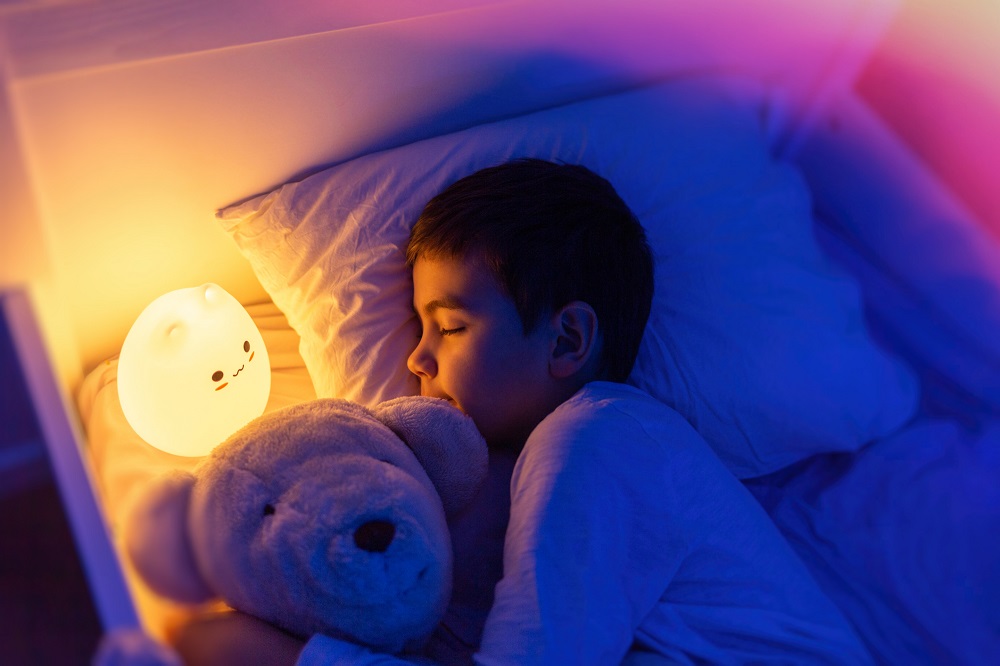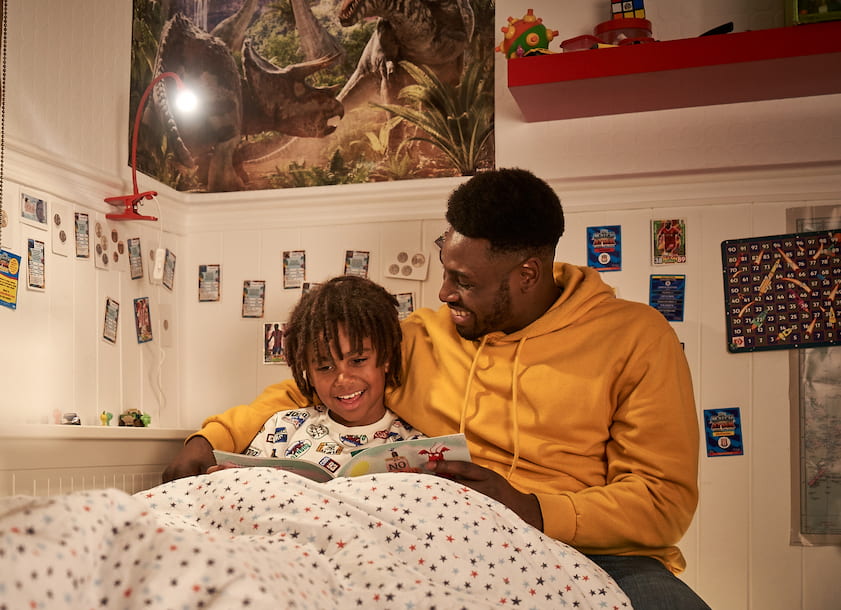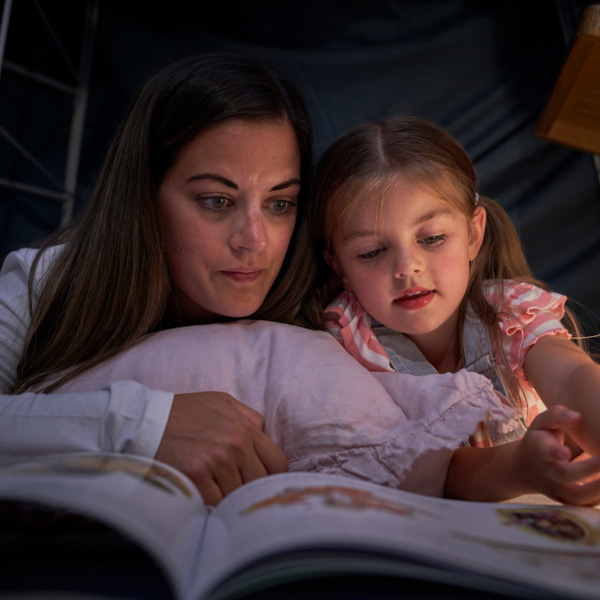We all know that getting kids to bed on time can be challenging – to put it lightly! Here are some things you can do to help make your bedtime routine easier and more fun for both of you.
How much sleep should my child be getting?
Children need a lot of sleep! All children are slightly different, but according to Sleep Action, kids aged 3-5 need around 10-13 hours, while those aged 6-13 need 9-11 hours. So think about the time you need to get them up most days and work backwards from that.
Things to try during the day
Tip #1: Keep active
It sounds obvious but the more fresh air and exercise your child gets during the day, the more tired they’ll be when bedtime rolls around. Our outdoor activities section has lots of suggestions for things to do outside, and we also have suggestions for keeping active indoors if you can’t get out.
Tip #2: No sleep 'til bedtime
Once your child is over 4, avoid naps during the day if you can. If your child really needs a wee sleep, make it for no more than 20 minutes, and make sure they’re awake again by 2pm. Any later will delay them feeling sleepy in the evening.
Tip #3: Worries away
If your child isn’t sleeping well, it may be because there’s something bothering them. For example, this could be the case if something has changed in their life, like moving house or starting school. Or they may be worried about something that’s happening at school or in their friend group, or something they’ve seen online.
If you suspect this may be the case, try talking to your child about it during the day. Don’t leave it until bedtime, in case it upsets them.
Our page on encouraging your child to confide in you has advice for helping them open up to you. And depending on what your child tells you, the following pages may help:
- Tips for helping your children if you split up with your partner
- Introducing a new baby brother or sister
- Starting primary school | Parent Club
- Helping your child with worries about going back to primary school | Parent Club
- Helping your child with problems with friends | Parent Club
- Talking to your child about climate change
- Talking to your child about current events
- What to do if your child has a negative experience online
Tip #4: Eat to sleep
Some foods can help the body feel sleepy. These include turkey and chicken, milk, beans, peanuts, sunflower and pumpkin seeds, eggs and spinach. So you might want to try serving these at tea time. If you need some inspiration you can find cheap, easy recipes featuring turkey, chicken, peanuts, spinach and eggs here.
Try not to make your child’s evening meal too close to bedtime. Try and leave a gap of at least two hours, so they’re not digesting overnight. If they need a snack an hour before bedtime, give them something light like milk, banana, crackers or toast.
Tip #5: Swap sugary foods for more healthy treats
Some foods make it harder to sleep – including chocolate, fizzy drinks and sweets. (Your dentist will tell you they’re not great for the teeth either!) So try to avoid giving your child these if you can, especially in the run up to bedtime. Our page on sugar has some suggestions for healthier alternatives to satisfy that sweet tooth.
Things to try in the evening
Tip #1: A routine still helps
Young children benefit from a regular bedtime routine just as much as toddlers do – older children and adults do too! Sticking to a predictable series of events most nights (like tea, quiet play, bath, tooth brushing, story time, sleep) can help lively minds prepare to settle down and get some zzzzs.
Tip #2: Be consistent
As much as you can, try and stick to the same time for lights out every night, even at weekends and during the holidays. This will help your child’s body ‘learn’ when it’s time to go to sleep and stop them feeling ‘jet lagged’ on Monday mornings.
Tip #3: Countdown to bedtime
If you find your child gets a bit hyper as soon as you mention bedtime, one thing you can try is a step count. Counting footsteps on the way to bed can help calm them down and go to sleep easier.
Tip #4: Introduce a 'wind down hour'
The more relaxed your child is before bedtime, the more likely they are to drop off quickly. So try to start your bedtime routine an hour before lights out, to give them time to calm down.
If you can, use this hour to spend some quiet time together chatting, listening to soft music, colouring or doing puzzles or doing some gentle stretching or breathing exercises together.
Dimming the lights at this point will send a signal that bedtime is on its way.
Tip #5: Bath before bed
A nice warm bath is a great way to get them ready to drift off. Try to avoid too much excitement and splashing – instead you could play games measuring water and bubbles in a jug or mixing ‘potions’ with shampoo. This is good for their maths skills too!
Tip #6: Make the bedroom a calm zone

Try and tidy away toys before bedtime so the bedroom seems calm and uncluttered.
If you can, keep the bedroom a device-free zone, to avoid temptation. If your child needs to charge their tech overnight, set up a charging station in the kitchen or living room.
Tip #7: How many hours until rise and shine?
Before bed, help your child read the time and talk about when you’re going to get up. You could help your little sleepyhead work out how many hours sleep they’ll have before they need to rise and shine. You could use a clock face or your fingers to help you count the hours together.
Tip #8: Story time not screen time

To get your kids off their devices and ready for bed, try letting them read to you before bed to help them drift off quicker. If they’re not keen, you could read to them – story time doesn’t have to stop when they start reading chapter books!
The blue light from a phone or tablet screen can stop your child sleeping, so it’s best not to let them look at screens for at least an hour before bedtime.
What if my children share a bedroom?
If your children share a bedroom, having an evening routine that everyone can get used to will really help them settle at night.
For example, if your children are a few years apart, you can stagger their bed times so that the younger child is (hopefully!) asleep before the older child goes to bed.
If the younger child wakes up when the older child goes to bed, you could try getting the older child into their PJs and then read with them in your room, to reduce the noise, then pop them into bed for lights out. Or you might get them both ready for bed at the same time, but then let the older child read or play quietly until their bed time.
On some nights there’s bound to be some chatting and giggling (or even arguing) after lights out. Some parents have a strict ‘no noise’ rule but others will let their kids chat and then settle themselves. There are no magic solutions, so just see what works for you.
You can find more useful advice about sharing bedrooms on the NSPCC website.
More information
Sleep Action offer advice and support to parents and carers, or to young people themselves, for any child aged 18 months to 18 years with a sleep problem. Visit the Sleep Action website to find out more and get in touch.
 Activities & Play
Activities & Play Behaviour
Behaviour Childcare
Childcare Development & Growing Up
Development & Growing Up Family, Friends & Relationships
Family, Friends & Relationships Feeding Your Baby
Feeding Your Baby Food & Eating
Food & Eating Health & Safety
Health & Safety Mental Health & Wellbeing
Mental Health & Wellbeing Money & Work
Money & Work Online Behaviour & Safety
Online Behaviour & Safety Pregnancy & First Days
Pregnancy & First Days School & Education
School & Education Sleep
Sleep









 Mental Health & Wellbeing
Mental Health & Wellbeing
 Health & Safety
Health & Safety